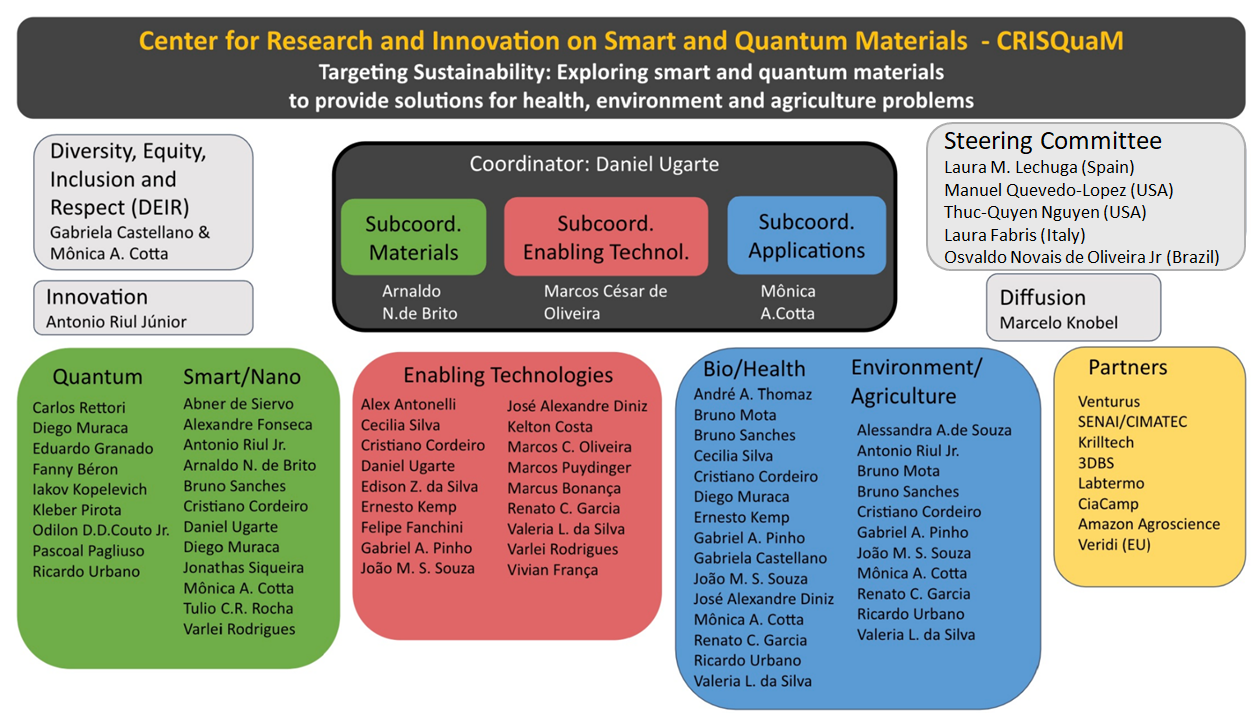BV-FAPESP: research projects supported in this Center
CRISQuaM in the Media: news about the center
CRISQuaM aims to explore the synergistic development of fundamental and applied science to create new materials with high potential for the construction of devices and sensors to address technological challenges related to sustainability, climate change, precision agriculture, ecology, and health. To achieve these goals, we have assembled an interdisciplinary and collaborative research team, integrating expertise across various scientific domains, researching novel materials with high innovation potential. By combining original synthesis methods, advanced characterization techniques, theoretical approaches, computational simulations, quantum technologies, and device construction designs, we aim to drive advances in smart and quantum materials, promoting scientific excellence and technological development. With this, we plan disruptive innovations in instrumentation—including hardware and AI-based tools—as well as in quantum technologies, biomedical devices, and signal processing, in addition to plant bionics, exploring plant-pathogen interactions. Besides research activities, we plan intensive actions in education, dissemination, and communication for the general public, as a modern society should be aware of the challenges humanity faces and how research and technology are essential for responsibly utilizing the planet's limited resources. CRISQuaM's Innovation activities are accelerated through partnerships with several companies in related technologies, many of them Brazilian. Finally, all activities of the Center are managed in accordance with diversity, equity, and inclusion goals and best practices.
The Center brings together scientists, engineers, and innovators in a collaborative effort to apply materials science and quantum technologies at the cutting edge, designing new materials and nano(bio)sensors for advanced diagnostics. The Center has a team capable of producing a wide range of (nano/micro) materials, along with precise chemical and physical characterizations using modern techniques (synchrotron, advanced microscopy, magnetotransport, magnetic resonance, optics, etc.). In addition, the team offers various options in enabling technologies, including miniaturization, processing, and additive manufacturing, as well as instrumentation, quantum sensing, and electronics development. Data analysis will employ updated approaches (numerical simulation, classical and quantum machine learning, and quantum optimization). Applications at the knowledge frontier will address urgent sustainability needs in environmental areas, precision agriculture, plant bionics, and biomedical interfaces, contributing to the development of local technologies in close partnership with the Brazilian industry.
The organization of the Center is based on three pillars — Materials, Enabling Technologies, and Applications — together with partner companies, as described in the figure below.

2025-01-30
Using a single-cell sequencing technique, it was possible to characterize the different cell types present in the brain lesion. The result paves the way for specific treatments against focal cortical dysplasia.
2025-01-30
Brazilian and British researchers have observed that a small crustacean that changes color according to the marine vegetation is able to disguise itself in exotic algae that did not evolve together with the species. However, the long-term effects of this interaction are unknown.
2025-01-29
Scientists at the University of São Paulo analyzed blood samples donated by six serodiscordant couples where female partners were resistant to SARS-CoV-2 despite intense contact with their infected male partners. Overexpression of the gene IFIT3 in these asymptomatic women suggests it affords protection and could be a target for novel antiviral therapies.
2025-01-29
UN recognition will enhance the visibility of FAPESP’s initiative to establish a new strategy for funding research on the southern portion of the Atlantic Ocean and the planet’s coldest continent.
2025-01-29
Using a technique from the oil industry, researchers show that chemical bonds with calcium and magnesium increase the soil’s capacity to store carbon, reducing emissions and increasing fertility; the process contributes to sustainable management.